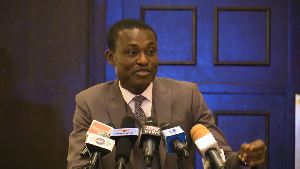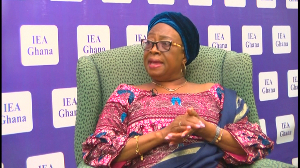The New Patriotic Party (NPP) has challenged the flag bearer of the National Democratic Congress, Former President John Mahama, to provide strategic policies and governance structures implemented during his tenure to combat illegal mining.
It said the NDC did not have any control policy to fight illegal mining, otherwise known as “galamsey, but is now criticising the NPP government for not doing enough to eradicate the canker.
Addressing a news conference in Accra, Mr Yaw Buaben Asamoa, the NPP Director of Communications, said the NDC did not demonstrate any viable alternative policy to combat illegal mining, but rather its flag bearer was threatening mayhem in the country, if the Electoral Commission (EC) went ahead to compile a new voters’ register for the December Election.
He said Former President John Dramani Mahama failed to institute strategic interventions to address illegal mining with two of his ministers throwing their hands in despair and admitted their failure to deal with the canker.
Mr Yaw Buaben Asamoa was responding to the recent media encounter organised by the NDC to ask the ruling NPP government to account for the missing excavators.
At a news conference held at the banks of River Pra in the Central Region last Sunday, the NDC accused the Akufo-Addo-led administration of failing to address the illegal mining challenges, resulting in continuous pollution of the water bodies and degradation of the environment.
Contrary to the NDC’s claims, Mr Yaw Buaben Asamoa said President Nana Addo Dankwa Akufo-Addo’s Government was implementing a number of strategic measures and had rolled out a roadmap to address the canker, with 900 of the 1,300 small-scale miners vetted, while their information was downloaded onto ‘GalamStop,’ a software that can track their mining activities.
Additionally, the Minerals Commission was registering interested persons across the 14 mining districts nationwide to undertake Community Mining and thus, allocated 300 concessions for legal mining.
More so, the Ministry of Chieftaincy and Religious Affairs had embarked on sensitisation programme nationwide to educate traditional authorities on government’s mining roadmap and policy so that they wouldn’t release lands for illegal mining.
Mr Yaw Buaben Asamoa stated that through the Ministry of Local Government and Rural Department, it was implementing an Alternative Livelihood Programme in 35 districts in 10 regions affected by illegal mining.
The beneficiaries are being trained in needle work and craft, batik/tie and dye, beads-making, dress-making, entrepreneurial skills, interior and exterior decoration, leather works, electrical installation, hair-dressing and other hands-on skill training and after completion government provided them with start-up tools and equipment.
“We’re also trying to use technology by way of imagery to read what’s happening on the ground and so we’re training 140 Nation Builder Corps (NABCO) as drone pilots who would use drones to monitor mining concessions, not only illegal miners, but legal miners who were registered and licensed to do proper mining.
“We’re also formalising the capacity of institutions, strengthening regulatory bodies and rolled out a roadmap with 80 mining community committees established to implement the modalities in the roadmap to ensure sustainable mining,” he said.
Mr Yaw Buaben Asamoa said the government had developed software known as “GalamStop” that was capable of containing all the data about small-scale mining and aid in tracking the activities of miners.
The software also makes the acquisition of mining licences at the Minerals Commission easier and transparent.
To monitor the turbidity of the water bodies effectively, Mr Yaw Buaben Asamoa stated that 60 experienced divers were sent to the military camp at Asutsuare for two weeks to assist Operation Vanguard with their riverine operations.
Again, he said the Inter-Ministerial Committee Against Illegal Mining had constructed two landing sites on River Pra at Beposo and River Ankobra at Axim to monitor the activities of illegal miners, while two 1x45ft STC Flat Bottom Boats were imported for transportation on those rivers.
In addition, eight local canoes were constructed and would be used by the Riverine Task Force to combat water-body destruction and 12 outboard motors were secured for their operations.
Politics of Friday, 21 February 2020
Source: GNA
NDC has no alternative policy to combat illegal mining
Galamsey conversation bigger than missing excavators - NPP
0 seconds of 3 minutes, 4 secondsVolume 90%
Press shift question mark to access a list of keyboard shortcuts
Keyboard Shortcuts
Shortcuts Open/Close/ or ?
Play/PauseSPACE
Increase Volume↑
Decrease Volume↓
Seek Forward→
Seek Backward←
Captions On/Offc
Fullscreen/Exit Fullscreenf
Mute/Unmutem
Decrease Caption Size-
Increase Caption Size+ or =
Seek %0-9
Galamsey fight: NDC, John Mahama are part of the problem - Buaben Asamoa
0 seconds of 1 minute, 44 secondsVolume 90%
Press shift question mark to access a list of keyboard shortcuts
Keyboard Shortcuts
Shortcuts Open/Close/ or ?
Play/PauseSPACE
Increase Volume↑
Decrease Volume↓
Seek Forward→
Seek Backward←
Captions On/Offc
Fullscreen/Exit Fullscreenf
Mute/Unmutem
Decrease Caption Size-
Increase Caption Size+ or =
Seek %0-9

















